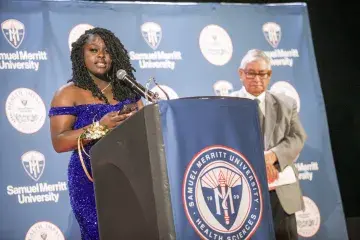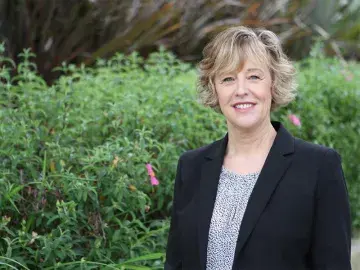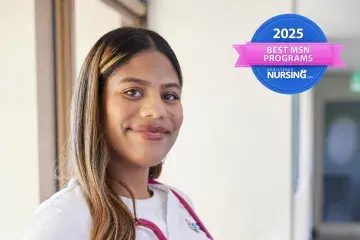Podcaster Ups Her Nursing Game

Last year, Annie Fulton, ABSN ’14, had reservations for a glorious two-week vacation to Italy, but Covid waylaid those plans. What was a nurse with time on her hands to do? Fulton, who listens to a lot of free, open-access, medical education podcasts (FOAM) thought nurses could benefit from more of a presence in the medium. So, the Accelerated Bachelor of Science in Nursing alumna hunkered down during her time off and created Up My Nursing Game, a podcast for nurses.
What inspired you to start a podcast?
I listen to a lot of FOAM educational podcasts. I see it as staying on top of the latest and greatest evidence-based practices. But, almost all the medical, educational podcasts out there are geared toward doctors. I enjoy listening to them, but half the content is over my head. I really noticed a hole in the market. I decided to create the podcast I always wanted to listen to.
In the title, does “my” refer to you, other nurses, or both?
Both. It’s about keeping nurses on top of their game. I don’t ever want to be stuck. I graduated nursing school in 2014 and don’t want to be a 2014 nurse for decades to come. Textbooks are outdated as soon as they’re published, but podcasts are cutting-edge.
Why a podcast?
Podcasts are super convenient, and nurses are busy people. We can listen to podcasts anywhere and anytime—exercising in the gym, driving to work, shopping for groceries, or cleaning your house.
On Up My Nursing Game, you discuss topics from alcohol abuse to end-of-life issues. How do you choose?
I’ve been a nurse for over six years now. I thought, "If I still don’t understand or am confused by something, I bet other nurses are, too.” I began to approach doctors who could provide clarity for these topics.
Who is in your audience?
My ideal audience is someone like me—an experienced hospital nurse working in an inpatient setting, who interfaces closely with doctors, occupational therapists, respiratory therapists, even spiritual care. But new nurses, nursing students, and doctors also listen. Some doctors have had “ah-ha” moments listening to my podcast. One told me he didn’t know that when he orders a potassium replacement that means the nurse has to hang four separate bags of potassium. He didn’t realize what his order entails for a nurse. I’d like to think that each doctor comes away learning something from each episode, as well as the nurse audience. It’s a two-way street.
What have you learned from the podcast?
Because I am now a podcast host, I am not so afraid to ask a doctor a clarifying question, and they aren’t as defensive in answering. Now doctors know that I’m honestly curious, and that I truly just want to add to my knowledge and improve patient outcomes.
How did SMU prepare you for this venture?
Samuel Merritt did a really good job of making us nurses feel empowered, rather than like passive members of a healthcare team. I remember a simulation lab where we dealt with a difficult work scenario: A doctor came into a room and was about to perform the wrong procedure on a patient. The nurse had to decide how to intervene, to be active and present. It was a great experience. In fact, I’d love to talk with faculty and students interested in collaborating on the podcast.
Did any particular classes or professors influence you at SMU?
Brenda Rengstorf. She brought this can-do attitude to nursing. When I first met her, I said that I wanted to become a flight nurse. Flight nurses go up in helicopters and do some pretty badass stuff. It takes years of experience, and only the cream of the crop qualify. I said, “I want to become a flight nurse, but I know that’s really hard to do, and it’s going to take years.” She said, “Yeah, but you can do it.”
I respect and respond to that can-do attitude. There are a lot of reasons I could say, “I can’t do this podcast: I work full-time; I’m a mom; There aren’t enough hours in the day.” But Brenda’s words rang in my head—and yeah, I can do it. I am doing it.


